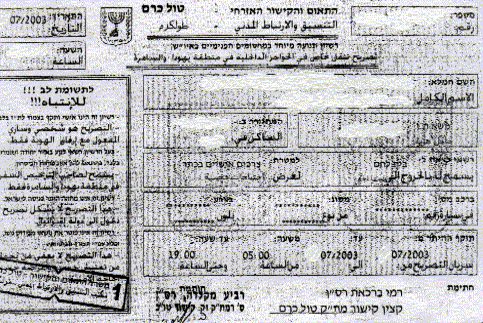Physicians for Human Rights 18 September 2003

Permit given by the civil administration permitting passage within the West Bank.
The Israeli section of Physicians for Human Rights published its latest policy paper “At Israel’s Will: The Permit Policy in the West Bank”.
After having prohibited Palestinians from entering into Israel; after having prohibited free passage between the West Bank and the Gaza Strip; after having prohibited their entrance into East Jerusalem; Israel is prohibiting internal movement within the West Bank. Any passage between one village and another is illegal, unless the Palestinian resident is “equipped” with a passage permit given by the Civil Administration. Such a situation, especially when prolonged, destroys and ruins all the civil systems that were built by the Palestinian society, including the health system.
Israel’s control of the physical passageways within the Occupied Territories, coupled with the massive finances invested into the building of the fence structure and system, verify that this is not a temporary arrangement.
To a great extent, these permits and the readiness of many sectors in Palestinian society to request them are the strongest evidence for the depth of oppression that Palestinian society experiences, and for the internalization of this oppression.
It is difficult to talk about a reasonable existence, not to mention a fair existence, when a population of 3.5 million depends upon “humanitarian gestures”. It is becoming progressively clearer to everyone dealing with the social and economic rights of Palestinians living in the Occupied Territories that more than anything else, the internal closure in all its various forms of blockade, curfew and permits is the main obstacle to the recovery of Palestinian society and all its civilian structures:
World Bank: “The sine qua non of economic stability and recovery is the lifting of closure in its various forms, and in particular internal closure. As long as Palestinian internal economic space remains as fragmented as it is today, and as long as the economy remains subject to extreme unpredictability and burdensome transaction costs, the revival of domestic economy and Palestinian welfare will continue to decay.”
Moreover, the deepening and perpetuation of separation policies via creation of urban enclaves hemmed in by fences, and their permanent isolation from areas which depend on them for their living (e.g., the rural surroundings of the towns of Qalqilia and Tul Karem) completely contradicts the public commitment of Israel and the international community to the creation of a viable Palestinian state, in which territorial contiguity and freedom of movement are ensured.